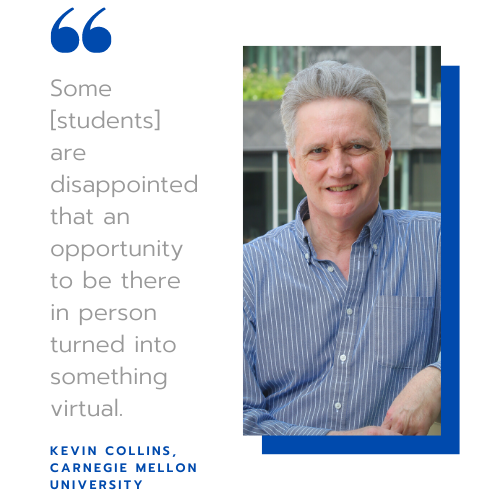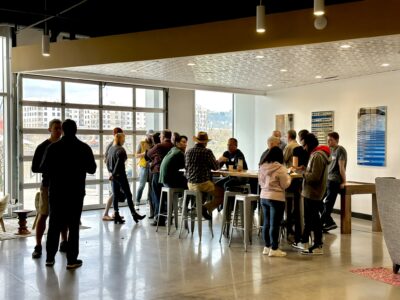
This yearlong editorial series is underwritten by Pittsburgh Innovation District. This article was not reviewed before publication. Learn more here and sign up for our weekly newsletter on jobs in the region here.
It was the height of the COVID-19 lockdown and vast swaths of the economy were shuttered. Unemployment fell to Great Depression levels. Yet Pittsburgh’s tech sector was remarkably okay.
According to a report from Dice, tech job postings increased by 10% in the city during the second quarter of 2020, when compared to the same quarter of 2019. Tech jobs have largely sustained around the country as more activities move online, but the continued growth of Pittsburgh’s job offerings is impressive by any standards.
The city’s tech job openings grew from May to June of 2020 by 44% — the biggest jump between those two months of any city covered in the report. At the same time, 20% of residents of Allegheny County had their job wiped away by the pandemic.
But the pandemic is bringing changes for companies that could last decades. The city faces an uncertain future for recruiting tech workers — a goal that political and industry leaders have long touted as a long-term anecdote to decades of deindustrialization. Most pressingly, companies around the country are allowing employees to work remotely on a permanent basis, and they are building geographically scattered workforces. This could impact cities that have bet some of their future on growing a pool of place-based tech jobs to lure new, highly-skilled residents. Experts also worry younger workers will be stunted by a lack of in-person experience with mentors, and a lack of mid-level jobs in the city.
So we asked four people who have an eye on jobs and economic development for their takes on how COVID-19 and the tidal wave of changes behind it may impact hiring in Pittsburgh’s technology sector:
Art Zeile, CEO of DHI Group
Zeile is the founder of Colorado-based Dice and a long-time tech investor and entrepreneur whose company authored the report, cited above.
The report found that places like Pittsburgh, Austin and North Carolina’s Research Triangle — areas that reinvented themselves as modest but respectable tech hubs in recent years — managed to increase their pace of tech hiring as the coronavirus kept much of the world as a standstill. At the same time, the old tech centers stalled: Job postings in New York and San Francisco decreased by 32%, from the second quarter of 2019 to that of 2020, and openings in Seattle diminished by 10%.
Zeile said he is not certain why, but a clue can be found in Pittsburgh’s data: the two companies advertising the highest number of tech job openings were PNC Bank and BNY Mellon, two banking outfits that are among the city’s largest overall employers.
Companies in more gilded markets may have halted hiring, predicting their new products and consumer items would be upended like so much else, he said, where institutions like mid-sized banks realized the immediate need to increase their tech offerings for a world that was doing less business in person.
“My take is that [banks] are some of the largest firms hiring software developers,” said Zeile. “More business is being done online and they have to create a mobile experience.”

For Zeile, the bible of creating a tech city is still “Rise of the Creative Class,” urbanist Richard Florida’s 2002 manifesto on urban revitalization, based much on his study of Pittsburgh as a professor at Carnegie Mellon University.
Florida had the then-novel idea that cities should stop spending on stadiums or sacrificing for tax breaks for corporations. Instead, revitalizing arts scenes and hip business districts would attract groundbreaking companies and high-earning tech workers. The approach has since been criticized as a driver of gentrification and a culture of rootlessness for the craft beer-drinking hipsters on whose shoulders the fates of cities apparently sit.
Still, Zeile thinks being a “hip” city will be the key to maintaining a tech sector, now and after COVID-19. “They bring together synergies. They have creativity in their code,” said Zeile. “Tech people like being around people with ideas,” he said. “They live for ideas and solving problems.”
In this respect, Pittsburgh is still well-positioned, particularly if technology workers abandon coastal cities and look to move inland for cheaper costs of living, Zeile said.
“It is perceived as a desirable city because of cost-of-living and the arts,” he said. “When I was building in the city [as an entrepreneur], it had a hip vibe and arts scene. So if you want to attract the technologists, they are looking for a hip place.”
Audrey Russo, CEO of the Pittsburgh Technology Council
Russo, who has led the advocacy group for tech companies since 2007, said member companies have found that working remotely was a comfortable pivot.
“People say productivity is high,” she said. “Scheduling meetings is easy. It’s good to be uninterrupted.”
Pittsburgh has a number of robotics firms that can’t allow remote work. But the firms that can allow staffers to work from home indefinitely are considering it, Russo said. This is becoming normative in the industry. Behemoths like Facebook, Twitter, Slack, Adobe and Microsoft have all announced that some employees can work from their living rooms and kitchen tables, permanently.
“People are starting to say the world is their market,” said Russo, “and I can get the best person from anywhere.”
This could be good for Pittsburgh companies, but not ideal for Pittsburgh. Russo said that high-skilled workers improve the local economy “fourfold” through taxes and spending. As remote work increases, the shift may mean a technologist hired by a Pittsburgh company can stay “wherever they live, contributing to that economy,” Russo said.

Tech employees are in-demand, so they can dictate a condition like permanent remote work from across the country.
Still, the effect might be less drastic on Pittsburgh than it is on some other areas.
“You see the fallout in New York City,” said Russo. “New York and New Jersey are having a mass exodus. If we live and work from home, do you want to live in 600 square feet?”
Pittsburgh may be able to make up the difference, keeping or attracting tech employees working remotely for companies in Palo Alto or San Francisco, congested and expensive areas whose nightlife and culture are hardly allures in an age of staying in.
“People will migrate to wherever they have the best life,” said Russo. “The good news of Pittsburgh is we have access to amenities, four seasons that are not brutal. We have great school systems.”
Pittsburgh, though, is far from perfect and if it’s going to attract people who could live anywhere, city leaders and stakeholders should work on some long-standing social problems, she said.
“People want to live in a diverse place,” Russo said, “not in a place that has one of the worst Black maternal death rates in the country. …. “We have a racial divide, a lack of representation [at large companies], a gap in education attainment. I don’t want us to be that city.”
“I think it’s both problematic and opportunistic,” she said: If location-contingent tech jobs no longer attract high-earners, the city should see that as an opportunity for soul-searching and fixing structural injustices, said Russo.
Earl Buford, chief executive officer of Partner4Work
Leading a workforce development organization formed by the governments of Pittsburgh and Allegheny County, Buford said his office has been concerned in recent months with immediate relief to laid-off people and developing plans for the long picture. So he hasn’t had much time to think about potential growth or loss in any particular segment.
In Allegheny County, “we got hit so hard and so fast with this, we’ve had to think about how we are going to look coming out of this,” Buford said.
He did say that the city’s tech sector won’t remain immune to trends nationwide. If the country’s technology economy shrinks — or its growth is curtailed — that will impact Pittsburgh.
“There’s a supply chain part of this piece,” said Buford. There are multiple small and startup companies in Pittsburgh that serve bigger companies. “They will be beholden to that.”

Buford sees the growth that was happening prior to the pandemic continuing now.
“Construction is continuing in the Strip District with a lot of tech companies,” he said. “There is still a desire to have a building. That’s not going to stop. There’s a reason they are doing that. People will continue to come through. It’s cheaper to live here.”
Fresh examples came in October: Aurora, an autonomous vehicle company already headquartered in the city, is moving into a new location in the Strip, and Oxford Development is continuing construction in the same area on a six-story, 145,000-square-foot office building it hopes to turn into a tech center.
Buford been watching trends in tech hiring for a while, and says that the career ladders offered in Pittsburgh have bigger structural issues. Startups and regional offices for companies like Google and Uber offer good prospects for an executive or a founder and for recent Carnegie Mellon University grads, but not enough between.
“We don’t have a handle on the mid-level tech jobs,” said Buford. “We have to figure that out. We have to work on talent development.”
Of course, he pointed out, issues like this might be even more difficult to resolve amid COVID-19-related disruption.
Kevin Collins, sr. assistant director of CMU’s career and professional development center
Collins advises some of the youngest tech workers impacted by COVID-19 and, arguably, some of the most impacted: Students graduating from Carnegie Mellon University’s School of Computer Science.
He said that students and recent graduates have had mixed thoughts about their virtual internships, staying in Pittsburgh and the prospect of working remotely period.
“Some of them are disappointed that an opportunity to be there in person turned into something virtual,” he said.

His biggest concern — and a large concern of many of his students — is that they will get lost in the background when they want to make big efforts early to establish themselves in competitive fields. It is harder to get individual attention from mentors and supervisors in a Zoom meeting.
Some internships have become “study halls,” he said, where students are given assignments to complete on their own, without interacting with or learning much from the staff.
“It’s a poor second choice to talking to them in person,” said Collins. “You don’t get the same experience in the company culture.”
Still, a familiar trend continued in the latest classes, as many students exited the program to jobs in Pittsburgh startups. Collins said they have even more interest staying in the city and the complications of moving during COVID-19 make it more attractive.
“They have laid down roots here,” he said.
Join the conversation!
Find news, events, jobs and people who share your interests on Technical.ly's open community Slack





